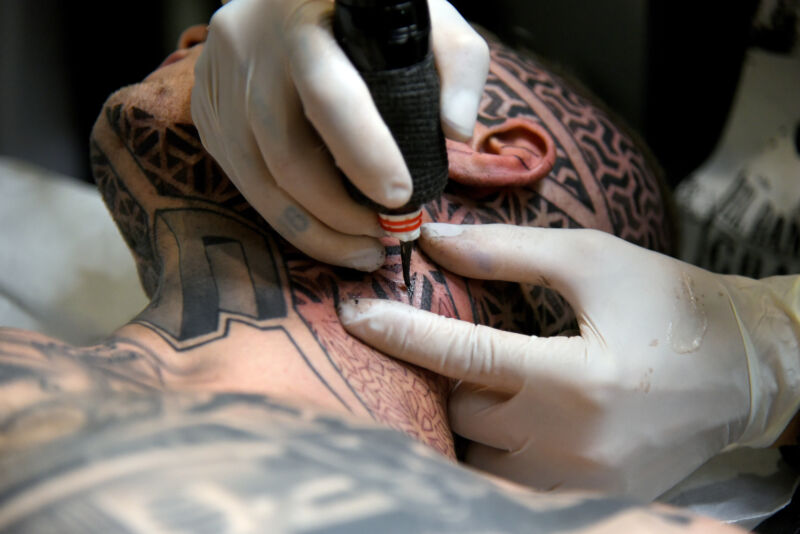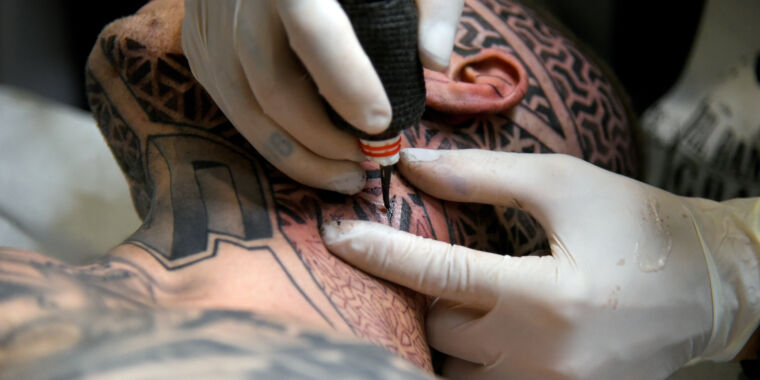
Fira de Barcelona hosts the XXIV edition of the Barcelona Tattoo Expo where tattoo artists from Spain and other countries exhibit tattoos and tattoo material such as ink, needles and special machinery for tattoo work. (Photo by Ramon Costa/SOPA Images/LightRocket via Getty Images)
The Food and Drug Administration has been warning for years that some tattoo inks are brimming with bacteria—a large assortment that, when injected into your skin, can cause inflammatory reactions, allergic hypersensitivity, toxic responses, and, of course, straight-up infections. And, worse yet, the labels that say the inks are sterile are not reliable.
But, a recent recall of three tattoo pigments from the same manufacturer does a good job of illustrating the FDA’s concerns. The water-based inks, all from Sierra Stain, had a bizarre array of bacteria, which were found at high levels, according to FDA testing.
One ink product—described as “Carolina Blue”—offered a microbial menagerie, with six odd species identified. They included a bacterium that often dwells in the gastrointestinal system and can inflame the mucosal lining of the intestines (Citrobacter braakii), a water-borne bacterium (Cupriavidus pauculus), and several that cause opportunistic infections (Citrobacter farmer, Achromobacter xylosoxidans, Ochrobactrum anthropi, and Pseudomonas fluorescens). These are bacteria that don’t typically go about attacking humans but will if the conditions are right, including when they find themselves inside a human with a compromised immune system.
An ink called “UV China Pink” contained an unusual soil bacterium (Curtobacterium citreum/pusillum). And an “All Purpose Black” ink puzzlingly contained Acetobacter senegalensis, a bacterium first isolated from mangos in Senegal and used for industrial vinegar production in low-income countries.
The three inks were sold nationwide through Amazon. To date, there have been no reported infections or adverse reactions linked to these inks. But the FDA notes that reactions to contaminated inks can be difficult to accurately diagnose. The infections and skin responses can look like generic rashes and allergic responses, sometimes including lesions with red papules in areas where the ink was injected, the FDA notes. However, infections from tattoo ink can leave permanent scarring.
In a study published in July in Applied and Environmental Microbiology, FDA researchers tested 75 samples of tattoo and permanent makeup inks from 14 manufacturers. Of the 75 inks, 26 (35 percent) were contaminated with a total of 34 types of bacteria, many that were possibly disease-causing. Some of the bacteria were anaerobic, meaning they don’t need oxygen to grow, suggesting they could thrive in the low-oxygen environment of skin layers. Of the 40 tattoo inks specifically, nine (22 percent) were contaminated. Among all the ink samples, 49 were labeled “sterile” and, of those, 16 (33 percent) were contaminated.
The recall announcement noted that Sierra Stain is no longer in business. While the company lists a remaining email address, it did not immediately respond to a comment request from Ars on the bacteria found in their inks.
The FDA recommends that consumers be vigilant about the quality and safety of tattoo supplies and techniques. It also encourages tattoo artists to work in professional environments that can reduce the risk of contamination.

